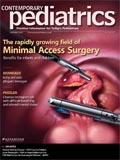BREAKING NEWS
Common household chemicals such as those found in nonstick cookware, food packaging, and fabrics—even microwave popcorn bags—can reduce the immune response to routine childhood immunizations. According to newly released study results, the more children are exposed to perfluorinated compounds, the less likely they are to have a good immune response to vaccinations. These results may not entirely surprise you, but they might help you to figure out what is wrong when a child’s vaccination didn’t seem to work. » More
|
NEW RESEARCH
Results of a survey of AAP members show that most US pediatricians bypass an ECG before starting children on stimulant medication for ADHD, opting for a routine cardiac history and physical examination instead. Find out how perceived barriers to cardiac screening influence clinical practice. » More
|
Survey
Do you agree with HHS Secretary Kathleen Sebelius’ directive to overrule the FDA decision that would have made emergency contraception available over the counter to all women, including those younger than 17 years old?
Yes
No
Click here to let us know.
Last month we asked whether it was right for child protective services to take an obese child away from the family. We found that this was an issue many of you felt the need to weigh in on. Read the surprising results here.
|
NEW RESEARCH
Half of teen mothers who became pregnant unintentionally say that they did nothing to prevent the pregnancy, according to data from a Centers for Disease Control and Prevention survey. The data show that misperceptions still abound regarding contraception and pregnancy, and it is never a bad idea to have frank talks with your patients—boys and girls alike.
» More |
|
The latest data from the National Health and Nutrition Examination Survey show that the overall prevalence of obesity in children may be leveling off at about 17%, in contrast to the rapid increases seen in the 1980s and 1990s. Another study showed that the availability of junk foods had little effect on weight gain in middle-school children. Learn why efforts to promote healthy eating may have to extend beyond the classroom.
» More |
|
Certain characteristics of autism spectrum disorder (ASD) may change as a child ages. An analysis of a national survey of children’s health found that children with a current diagnosis of ASD were more likely to have a co-occurring neurodevelopmental or psychiatric condition, such as learning disability or depression, than those with a past (but not current) diagnosis of ASD. This is important information to have when arriving at an ASD diagnosis.
» More |
|
Stretching infant formula by dilution or reduced feedings exposes babies to serious developmental risks, yet it can be a monthly temptation for families receiving supplemental nutrition assistance. Find out how families forced to resort to formula stretching can be better identified and what other options can be offered to them.
» More |
|
Confirm your
e-newsletter subscription click here.
To ensure future delivery of email newsletters from Contemporary Pediatrics please take a moment to confirm your subscription by clicking here.
Thank you,
Contemporary Pediatrics Staff |
Digital Edition |

|
|
|
You are subscribed to %%list.name%% as %%emailaddr%%. Click here to unsubscribe or edit your member profile.
To ensure delivery to your inbox, please add us to your address book. If you need help doing this, Click here.
Advanstar Communications provides certain customer contact data (such as customers' names, addresses, phone numbers and e-mail addresses) to third parties who wish to promote relevant products, services and other opportunities which may be of interest to you. If you do not want Advanstar Communications to make your contact information available to third parties for marketing purposes, simply call (toll free) 866-529-2922 at any time, or
fax us at 218-740-6417. Outside the U.S., please phone 218-740-6395. Contact us by mail at Advanstar Communications Inc., 131 West First St., Duluth, MN 55802-2065, USA.
|
|
|
